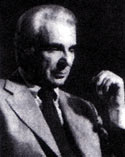For a closer view of things there are several telescopes to zoom in on points of interest. At the top of Lycabettos - and something not to be missed, is the small 19th century chapel of St. George. The walls and ceiling of the chapel are adorned by colorful frescoes representing biblical scenes. People come to light a candle and say a prayer, which I do and then many kiss the icon of St. George slaying the dragon which for reasons I can't explain don't do. All in alI, visiting Lycabettos while you are in Athens is a wonderful experience which you won't forget.
My second reason for remembering Lycabettos is a rather sad experience. During the Civil War in Greece in 1943 which is one of the most tragic times in Greek history -the insurgents or a short period captured and occupied Lycabettos.
It was the most strategic point in all of Athens for bombing. From Lycabettos the insurgents had a clear view of scores of different and important targets.
At this time I was with our State Department in the UNRRA office. Our main job was to feed a starving Greece, In this connection I helped establish a rather large soup kitchen on Constitution Square across the Grande Bretagne Hotel. I remember it was Sunday morning around eleven o'clock and already there was a line a block long of people coming to the soup kitchen. We offered bread, bean soup, powdered eggs, rice and fruit. (Even very hungry Greeks didn't like the powdered eggs). It was about a quarter to twelve when Laird Archer, Chief of Greek War Relief, sent a boy with a message to come to see him and said there was a Close friend who wanted to see me. It was Spyros Skouras. Arher and Skouras were congratulating me on my work with the soup kitchen. We had a clear view of the soup kitchen from Archer's office in the Grande Bretagne. There was still a block long line of people waiting to be fed and Skouras was asking me how many people we fed a day. In the middle of the conversation and in full view of the soup kitchen a bomb came from Lycabettos, blowing up the soup kitchen and killing nearly 58 people and injuring hundreds in Constitution Square.
When General Scobie was told about this tragedy he became very determined to capture the insurgents on Lycabettos. Bombing them from the air was not feasible because the insurgents operated out of the chapel of St. George, a sacred place. But eventually British troops under great fire were able to surround the insurgents and speak to them. Colonel Michael Lubbock, who incidentally was a classmate of mine at Oxford representing General Scobie, very diplomatically told the insurgents that if they surrendered they would be free to go. Also Lubbock told me afterward's he also pointed out "How sad, don't you want to stop Greek killing Greek?"
After further discussion the insurgents accepted this offer and marched off free. This decision was much criticized by the Greeks.
No punishment for killing at least 58 Greeks!
But at least, Lycabettos was under the control of the British and there was no more bombing. But even today there is still much discussion of the British decision to let the insurgents free without any punishment.
To return to the more enjoyable part of visiting Lycabettos, today there is a Funicular railway that you can ride to the to which I always take. You can choose to walk up. The walk is fairly steep but it is rewarding with the most superb views of Athens as you climb higher.
Finally there is one thing you should remember about the blessed land of Greece. There is an ancient myth about everything, every place, every temple, every olive grove, every single nook and cranny. The story, therefore of how Lycabettos Hill happened to be in Athens, could be no exception to the rule. Legend has it what the goddess Athena wanted her temple on the Acropolis to be closer to the sky.
So, one stormy night, she went to Mount Penteli and extracted a huge rock from it, which she intended to place on top of the existing one. Unfortunately, two black birds approached her as she was carrying the rock and gave her some extremely bad news which meant that she had to attend to them immediately in her fury and hurry she dropped the rock right in the middle Athens. After that, the goddess apparently forgot all about it, and this 847 foot hill, has been in Athens ever since for everybody to visit and enjoy.


